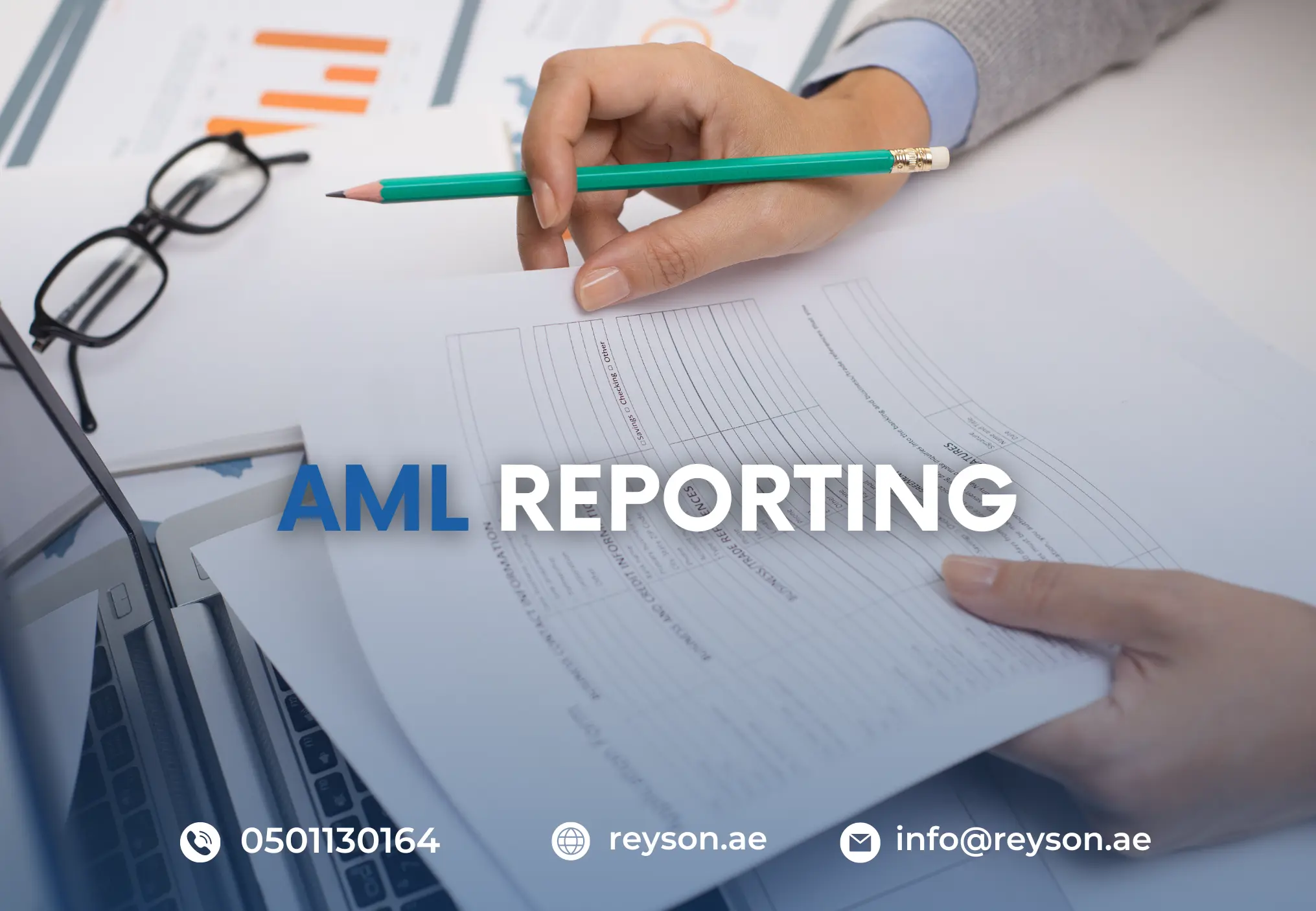
AML (Anti-Money Laundering) reporting services in the UAE are essential for financial institutions and designated non-financial businesses and professions (DNFBPs) to fulfill regulatory obligations aimed at preventing financial crimes. These services include systematic reporting of suspicious transactions, customer due diligence findings, and compliance assessments to regulatory authorities like the Central Bank of the UAE and the Financial Intelligence Unit (FIU). Reporting entities must adhere to strict guidelines and frameworks set forth by UAE laws and international standards to maintain transparency and integrity in financial transactions.

Effective AML reporting plays a critical role in safeguarding the UAE's financial system from illegal activities such as money laundering and terrorist financing. By reporting suspicious activities precisely and accurately, financial institutions and DNFBPs help detect and prevent criminal activities, thus improving overall financial stability and regulatory compliance. Compliance with AML reporting requirements not only reduce risks associated with financial crimes but also strengthens the UAE's reputation as a secure and transparent financial hub
In the UAE, financial institutions and designated non financial businesses and professions (DNFBPs) are required to submit various types of Anti-Money Laundering (AML) reports to ensure compliance with regulations and to aid in the identification and stoppage of terrorist financing and money laundering operations. The primary types of AML reports include:
AML (Anti-Money Laundering) reports are structured to include essential components that help compliance and detection of suspicious activities:
The Financial Intelligence Unit (FIU) plays a crucial role in receiving, analyzing, and disseminating Suspicious Transaction Reports (STRs) to combat money laundering and terrorist financing. The FIU is responsible for processing STRs, identifying patterns and trends, and sharing intelligence with law enforcement agencies and other stakeholders.
The FIU processes STRs in a secure and confidential manner. Upon receiving an STR, the FIU reviews and analyzes the report to determine whether it warrants further investigation. The FIU may request additional information from the reporting entity or share the report with other agencies to facilitate investigations.
A suspicious transaction refers to a transaction that appears unusual or suspicious, and may indicate money laundering or terrorist financing activities. Such transactions may involve large cash transactions, unusual patterns of transactions, or transactions that lack a legitimate business purpose.
Reporting entities, such as banks and financial institutions, are required to identify and report suspicious transactions. This involves monitoring transactions, identifying unusual patterns or activities, and reporting suspicious transactions to the FIU.
Reporting entities are required to report suspicious transactions to the FIU. This requirement applies to all entities that are subject to anti-money laundering (AML) regulations, including banks, financial institutions, and designated non-financial businesses and professions (DNFBPs).
Reporting entities must follow established procedures for reporting suspicious transactions. This typically involves completing a Suspicious Transaction Report (STR) form and submitting it to the FIU through a secure online portal or other designated channel.
Reporting entities must submit STRs to the FIU as soon as possible after the suspicious transaction is detected. The FIU requires reporting entities to submit STRs within a specified timeframe, typically within 5-14 calendar days from the date of detection.
To effectively manage Anti-Money Laundering (AML) compliance in the UAE, businesses face several challenges and can adopt best practices:
Record Keeping
Reporting entities are required to maintain accurate and detailed records of all transactions, including suspicious transactions. These records must be retained for a minimum period of 5 years from the date of the transaction and made available to the FIU upon request.
Reporting entities must maintain the following types of records:
The AML (Anti-Money Laundering) compliance reporting process includes a systematic approach that financial institutions and certain businesses must follow to fulfill their legal obligations in detecting and reporting suspicious activities that could be related with money laundering and other financial crimes.
Reyson Badger specializes in complete Anti-Money Laundering (AML) compliance and reporting services, customized to meet the strict regulatory requirements in various jurisdictions. Our expert team provides strong solutions that help financial institutions and businesses manage the complex landscape of AML regulations effectively. Reyson Badger offers a range of services, including conducting AML health checks, implementing strong AML policies and procedures, and providing ongoing monitoring and reporting solutions. Our customized approach ensures that clients not only meet regulatory obligations but also improve their overall risk management frameworks to prevent financial crimes effectively. With Reyson Badger's dedicated support, clients can streamline their AML compliance efforts, reduce risks, and maintain a strong reputation in the marketplace.
What is an Annual AML Report, and why is it important?
An Annual AML Report is a comprehensive summary of an organization’s anti-money laundering activities over the past year. It includes details on STR filings, risk assessments, and training programs. The Annual AML Report helps demonstrate compliance with AML reporting obligations and provides insights for improving AML processes.
How Annual AML Report does help organizations?
An AML Audit Report assesses the effectiveness of an organization’s AML program, including policies, procedures, and controls. It identifies gaps and ensures compliance with AML reporting requirements. The AML Audit Report is essential for strengthening AML frameworks and meeting regulatory expectations.
What is an AML Suspicious Transaction Report (STR), and when should it be filed?
An AML Suspicious Transaction Report (STR) is filed when a transaction raises suspicions of money laundering or terrorist financing. It is a critical part of AML reporting obligations and helps authorities investigate and prevent financial crimes. Timely filing of the AML Suspicious Transaction Report (STR) is mandatory for AML reporting entities.
What is an AML Reporting Entity, and what are its responsibilities?
An AML Reporting Entity is any organization, such as a bank or financial institution, required to comply with AML reporting obligations. These entities must monitor transactions, file STRs, and adhere to AML reporting requirements to prevent and detect financial crimes effectively.
What are AML Reporting Requirements, and why do they matter?
AML Reporting Requirements are regulations that mandate organizations to detect, report, and prevent money laundering activities. These include filing STRs, conducting customer due diligence, and maintaining records. Compliance with AML Reporting Requirements is essential for avoiding penalties and ensuring a robust AML program.
What is an AML Reporting Threshold, and how does it work?
An AML Reporting Threshold is the monetary limit that triggers AML reporting obligations. Transactions exceeding this threshold must be scrutinized and reported if suspicious. The AML Reporting Threshold helps AML reporting entities focus on high-risk activities and comply with AML reporting requirements.
What are AML Reporting Obligations, and who must comply with them?
AML Reporting Obligations require organizations to monitor, detect, and report suspicious activities to regulatory authorities. These obligations include filing STRs and adhering to AML reporting requirements. Compliance with AML Reporting Obligations is critical for preventing financial crimes and maintaining regulatory trust.
The deadlines for submitting Anti-Money Laundering (AML) reports in the UAE vary depending on the type of report and the regulatory authority. Generally, AML reports must be submitted within the following timelines:
Suspicious Transaction Reports (STRs): Immediately, but no later than 5 working days from the date of detection.
Currency Transaction Reports (CTRs): Within 5 working days from the date of the transaction.
Other AML reports: As specified by the relevant regulatory authority.
goAML is a web-based platform used by the UAE's Financial Intelligence Unit (FIU) to collect and analyze AML reports. To register on goAML, follow these steps:
1. Visit the goAML website and click on "Register".
2. Fill out the registration form with your organization's details.
3. Upload the required documents, such as your trade license and certificate of incorporation.
4. Wait for the FIU to verify your registration and provide you with a username and password.
Non-compliance with AML reporting requirements in the UAE can result in significant penalties, including: